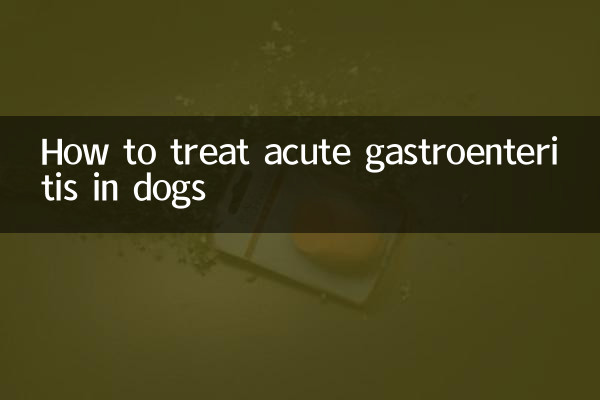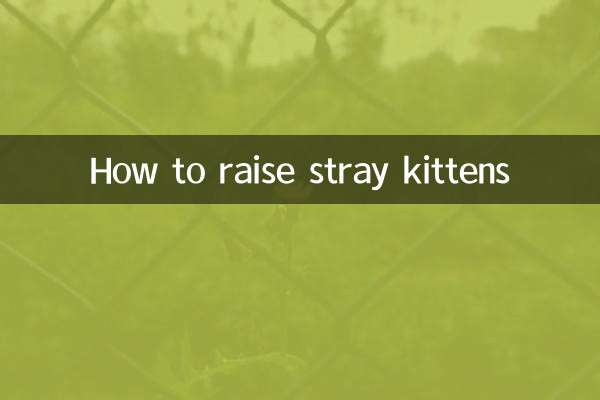How to treat acute gastroenteritis in dogs
Recently, pet health issues have become one of the hot topics, especially the prevention and treatment of acute gastroenteritis in dogs, which has triggered widespread discussion. This article will combine the hot content of the entire Internet in the past 10 days to provide you with a detailed analysis of the causes, symptoms, treatment methods and preventive measures of acute gastroenteritis in dogs, and provide structured data for reference.
1. Common causes of acute gastroenteritis in dogs

Acute gastroenteritis in dogs is usually caused by the following reasons, and owners need to pay special attention to:
| Cause type | specific reasons | Proportion (reference data) |
|---|---|---|
| Improper diet | Eating spoiled food, overeating, sudden food changes | 45% |
| viral infection | Parvovirus, coronavirus, etc. | 30% |
| bacterial infection | Salmonella, E. coli, etc. | 15% |
| other factors | Stress response, parasitic infection, poisoning, etc. | 10% |
2. Identification of main symptoms
Timely detection of abnormal symptoms in dogs is key. The following are typical manifestations of acute gastroenteritis:
| Symptom type | Specific performance | Hazard level |
|---|---|---|
| digestive symptoms | Vomiting (may be bloody), diarrhea (watery or bloody stools), abdominal pain | high |
| systemic symptoms | Listlessness, loss of appetite, fever | middle |
| dehydration symptoms | Poor skin elasticity, sunken eye sockets, dry gums | urgent |
3. Family emergency measures
If your dog is found to have the above symptoms, you can take the following emergency measures:
| Processing steps | Specific operations | Things to note |
|---|---|---|
| fasting food and water | Stop feeding for 4-6 hours and provide warm water in small amounts and frequently | Puppies no older than 4 hours |
| Supplement electrolytes | Use pet-specific electrolyte solutions | Do not use human rehydration salts |
| drug treatment | Probiotics (for pets only), antiemetics (for use under medical advice) | Do not use human drugs without authorization |
| diet modification | Feed low-fat and easily digestible food (such as chicken porridge) during the recovery period | Eat small meals more often |
4. Professional treatment plan
If symptoms persist or worsen, seek medical attention immediately. Your veterinarian may take the following treatment measures:
| Treatment | Applicable situations | Commonly used drugs/methods |
|---|---|---|
| Infusion therapy | Moderate to severe dehydration | Lactated Ringer's solution, glucose, etc. |
| antibiotic treatment | bacterial infection | Enrofloxacin, metronidazole, etc. |
| Antivomiting and diarrhea | persistent vomiting and diarrhea | Maropitant, white clay, etc. |
| special treatment | Viral/parasitic infections | Antiviral drugs, anthelmintics, etc. |
5. Preventive measures
Prevention is better than cure, please pay attention to:
| prevention direction | Specific measures | Execution frequency |
|---|---|---|
| Diet management | Feed regularly and quantitatively and avoid feeding human meals | daily |
| Environmental health | Disinfect food utensils regularly and keep living environment clean | weekly |
| health monitoring | Regular deworming, physical examination and vaccination | As recommended by your veterinarian |
| stress control | Avoid sudden changes of environment and reduce fright | continued |
6. Key points of nursing care during recovery period
Dogs require special care during recovery:
| nursing project | Specific content | duration |
|---|---|---|
| dietary transition | Gradually transition from a liquid diet to a normal diet | 3-7 days |
| activity restrictions | Avoid strenuous exercise and stay rested | to full recovery |
| Symptom monitoring | Record bowel movements and mental state | daily |
| Follow-up examination | Follow up with doctor’s advice to evaluate recovery status | Depends on the condition |
7. Reminder of common misunderstandings
According to recent hot discussions on pet medical care, owners are particularly reminded to avoid the following misunderstandings:
1.Unauthorized use of human drugs: Certain human drugs (such as ibuprofen) can be fatal to dogs
2.Overreliance on home remedies: Delay in seeking medical treatment in severe cases may be life-threatening
3.Ignore symptoms of dehydration: Dehydration in puppies can lead to death within 12 hours
4.Returning to eating too early: May increase gastrointestinal burden and lead to recurrence of symptoms
5.Don't pay attention to prevention: Regular deworming and vaccination can effectively prevent a variety of gastrointestinal diseases
8. Summary
Acute gastroenteritis in dogs is a common disease but should not be taken lightly. By understanding the cause, recognizing the symptoms, mastering the correct emergency response methods, and cooperating with professional veterinary treatment, most cases can be successfully recovered. Preventive measures and scientific feeding are the keys to reducing the incidence. In case of emergency, please contact a professional pet hospital immediately to obtain the best treatment opportunity for your dog.

check the details

check the details